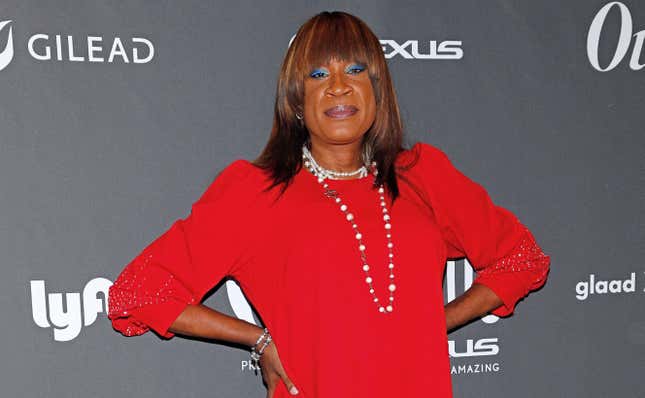
There was a time in the not-too-distant past that seeing women in GQ was simply a signifier of who cis-hetero, mostly white men had deemed the “sexiest women alive.” It was a ranking that proved problematic—particularly when it occasionally zeroed in on race and age—and unsurprisingly, has seemed to fade away in recent years (at least, based on a basic Google search). So, it’s not a minor deal that GQ’s September issue includes a glamorously shot feature of a woman best known for her advocacy in New York City’s trans and sex-worker communities—and is middle-aged, Black and trans herself.
Ceyenne (pronounced like “Cayenne,” as in pepper) Doroshow is the founder and executive director of GLITS (Gays and Lesbians Living in a Transgender Society), and as Harron Walker, contributing writer to our sister site, Jezebel, writes: “[S]he’s served as a kind of one-woman Swiss Army knife for those who’ve needed help of virtually any kind.”
“Giving people opportunities is a wonderful thing,” Doroshow tells Walker. “Not failing them is the bigger thing—not letting them fail themselves.”
“It’s all about setting people up to be able to make choices,” she adds. “Do you want to go to college? Okay, let’s find programming and grants to help pay your tuition and rent. If college is not your thing, maybe you want to go to trade school. Let’s get you there. If you want to be a sex worker, how do we teach you to do that sustainably and minimize your risks? You can be whatever you want to be, but let’s find a way to do it sustainably.”
Doroshow’s been doing the work for decades, but her recent fame has come as a result of her appearance at June’s Brooklyn Liberation rally, the event attended by more than 15,000 people clad in white, now widely recognized as the “largest trans-based protest in history.”
Doroshow’s speech, which rousingly opened with “We’re whores!” went viral, as did her message of affirmation, empowerment and love for her embattled and endangered community, to whom she said:
“I want you to breathe and sustain! I want you to stand tall and proud and Black and live.”
She backed up her calls for change and accountability for the Black trans community—including supporting sex workers, incarcerated trans women and the homeless—with an announcement. GLITS had remarkably raised $1 million just that week; money used to put a down payment on a $2 million, 12-unit building in Queens, N.Y. intended to house trans people, a longtime challenge with newfound urgency amid the pandemic. And as the crowd roared, she added: “We’re still raising money, motherfuckers!”
It was in many ways a watershed moment—and one Walker rightly compares to the far less enthusiastic reception of trans rights pioneers Marsha P. Johnson and Sylvia Rivera at gay liberation events a half-century prior. Doroshow is leveraging her newfound visibility—but only for the sake of the less visible members of the community she remains committed to.
Her concern lies more with how her growing profile as a movement leader might impede the work she does with GLITS. Tending to an image or juggling press commitments is, for Doroshow, not nearly as important as securing stable housing and employment for Black trans people and sex workers, helping folks transition out of prison, assisting asylum seekers in coming to the United States, and the myriad other priorities constantly vying for her attention...
“I just want people to know that they have me. I am not unreachable. I am not unapproachable because this all happened.” She laughs. “I’m still the same fucking bitch!”
Walker’s nearly 5,000-word profile of Doroshow is extensive, intimate and empathetic, chronicling her journey from her pre-transition days to sex worker to a “godmother” of the New York Black trans community.
“She is quite literally the embodiment of what it means to love people who look like her,” Asanni Armon, founder of For the Gworls, tells GQ. “That’s really beautiful and really rare in this moment.”
If Doroshow’s vision is fulfilled, the money GLITS has raised thus far will go to good use. “We’re talking to developers about opening up a sex-worker health care clinic on the ground floor,” she tells Walker. “Another place we’re looking at has eight apartments, with a restaurant downstairs. Imagine that! A trans-owned, trans-run restaurant right here in New York.”
It’s the kind of hopeful narrative one might expect to see during a season of Pose, but would be nothing short of transformative in the lives of the real-life communities upon which those characters are based (and many of the actors who play them hail from). As GQ reminds us, both the life expectancy and prospects of Black trans folk remain grim:
“At least 26 trans and gender-nonconforming people have been reported killed to date in the U.S. this year, the majority of whom were Black,” Walker reports, later citing a 2015 study to note: “In the greater job market, Black trans people are unemployed at four times the rate of the general population.”
For those who survive, thriving becomes yet another challenge as a member of the most marginalized community in America, and typically the last to be mentioned in the outcries over lost Black lives. Doroshow, reflecting on the life and tragic and mysterious 1992 death of Marsha P. Johnson, is not immune to those concerns; indeed, it reinforces the need for her work.
“How she was treated at the end of her life? How supported was she?” she asks. “If people were really looking out for her—really supporting her—why was she out on that pier the night she lost her life?”
“Why?” is a question we should all be asking when it comes to the ongoing lack of support and protections for the Black trans community—and while Doroshow’s advocacy is incredible, one also can’t help but long for the day she and others like her are allowed to just be.
“I think I’m a neighbor, a mom, a friend, a tart,” she laughs.

